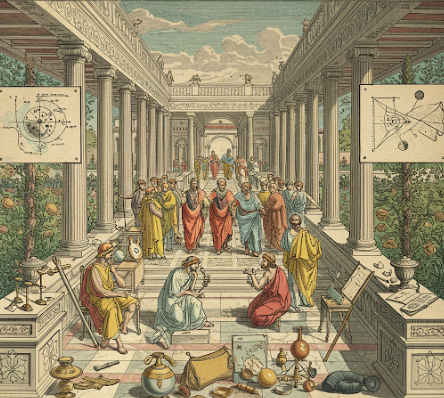Introduction
Aristotle's Lyceum, founded in 335 BCE in Athens, was one of the most significant educational institutions of the ancient world. Unlike Plato's Academy, which emphasized metaphysical and idealist philosophy, the Lyceum focused on empirical research and systematic observation, laying the groundwork for scientific inquiry. Aristotle's teachings, methodologies, and research at the Lyceum profoundly influenced Western philosophy, science, and education for centuries.
The Foundation of the Lyceum
Aristotle established the Lyceum after returning to Athens following his tenure as tutor to Alexander the Great. Situated near a grove dedicated to Apollo Lyceus, the institution served as both a school and a research center. The Lyceum was unique in its open structure, allowing students and scholars to engage in discussions while walking through the peripatos, a covered walkway, earning its scholars the name "Peripatetics."
Teaching Methods and Curriculum
Aristotle’s teaching methods were characterized by observation, classification, and logical analysis. Unlike his mentor Plato, Aristotle emphasized empirical data and firsthand experience. His curriculum covered a vast array of subjects, including:
Logic and Rhetoric: Aristotle formulated the principles of deductive reasoning, laying the foundation for formal logic.
Natural Sciences: He conducted extensive studies in biology, botany, and zoology, pioneering classification systems still influential today.
Ethics and Politics: Aristotle explored human behavior, morality, and the ideal state, documented in works like Nicomachean Ethics and Politics.
Metaphysics: He examined the nature of being, causality, and existence, differentiating himself from Plato’s idealism.
Literature and Aesthetics: His Poetics provided one of the earliest systematic analyses of drama and poetry.
Research and Contributions
Aristotle’s Lyceum was not only a place for philosophical discussions but also a research institute. He and his students collected data on various subjects, contributing to:
Biology and Classification: Aristotle was the first to systematically study animals, classifying them into groups based on shared characteristics, a precursor to modern taxonomy.
Physics and Astronomy: He theorized about motion, causation, and celestial spheres, influencing medieval and Renaissance scientific thought.
Political Science: Aristotle analyzed different political systems, categorizing governments into monarchies, aristocracies, and democracies.
Historiography: He compiled historical and cultural records of numerous city-states, contributing to early historiography.
The Lyceum’s Legacy
After Aristotle’s death in 322 BCE, the Lyceum continued under his successors, including Theophrastus, who advanced botanical studies. Though the institution eventually declined, its influence persisted through the Roman period and into the Renaissance, shaping disciplines from logic to ethics and empirical science.
Conclusion
Aristotle’s Lyceum revolutionized education by prioritizing observation and critical analysis over abstract theorization. His interdisciplinary approach made the Lyceum one of the earliest examples of a research university, and his teachings continue to shape modern philosophy, science, and political thought.









